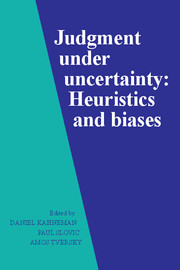Book contents
- Frontmatter
- Contents
- List of contributors
- Preface
- Part I Introduction
- Part II Representativeness
- Part III Causality and attribution
- Part IV Availability
- Part V Covariation and control
- 15 Informal covariation assessment: Data-based versus theory-based judgments
- 16 The illusion of control
- 17 Test results are what you think they are
- 18 Probabilistic reasoning in clinical medicine: Problems and opportunities
- 19 Learning from experience and suboptimal rules in decision making
- Part VI Overconfidence
- Part VII Multistage evaluation
- Part VIII Corrective procedures
- Part IX Risk perception
- Part X Postscript
- References
- Index
19 - Learning from experience and suboptimal rules in decision making
Published online by Cambridge University Press: 05 May 2013
- Frontmatter
- Contents
- List of contributors
- Preface
- Part I Introduction
- Part II Representativeness
- Part III Causality and attribution
- Part IV Availability
- Part V Covariation and control
- 15 Informal covariation assessment: Data-based versus theory-based judgments
- 16 The illusion of control
- 17 Test results are what you think they are
- 18 Probabilistic reasoning in clinical medicine: Problems and opportunities
- 19 Learning from experience and suboptimal rules in decision making
- Part VI Overconfidence
- Part VII Multistage evaluation
- Part VIII Corrective procedures
- Part IX Risk perception
- Part X Postscript
- References
- Index
Summary
Current work in decision-making research has clearly shifted from representing choice processes via normative models (and modifications thereof) to an emphasis on heuristic processes developed within the general framework of cognitive psychology and theories of information processing (Payne, 1980; Russo, 1977; Simon, 1978; Slovic, Fischhoff, & Lichtenstein, 1977; Tversky & Kahneman 1974, 1, 1980). The shift in emphasis from questions about how well people perform to how they perform is certainly important (e.g., Hogarth, 1975). However, the usefulness of studying both questions together is nowhere more evident than in the study of heuristic rules and strategies. The reason for this is that the comparison of heuristic and normative rules allows one to examine discrepancies between actual and optimal behavior, which then raises questions regarding why such discrepancies exist. In this chapter, I focus on how one learns both types of rules from experience. The concern with learning from experience raises a number of issues that have not been adequately addressed; for example, Under what conditions are heuristics learned? How are they tested and maintained in the face of experience? Under what conditions do we fail to learn about the biases and mistakes that can result from their use?
- Type
- Chapter
- Information
- Judgment under UncertaintyHeuristics and Biases, pp. 268 - 284Publisher: Cambridge University PressPrint publication year: 1982
- 47
- Cited by



